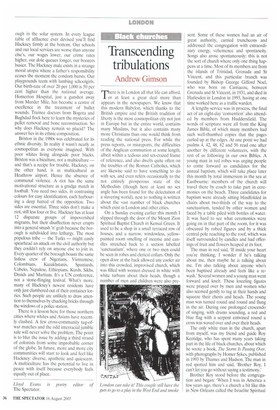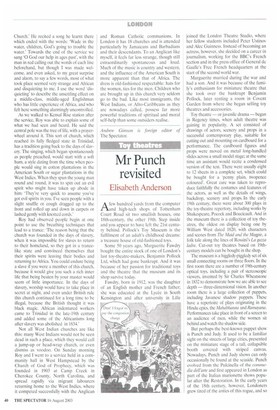Transcending tribulations
Andrew Gimson
There is in London all that life can afford, or at least a great deal more than appears in the newspapers. We know that this modern Babylon, which thanks to the British empire and the British tradition of liberty is the most cosmopolitan city not just in Europe but in the entire world, contains many Muslims, but it also contains many more Christians than one would think from reading the national press. For while the press reports, or misreports, the difficulties of the Anglican communion at some length, albeit within a tedious and sex-crazed frame of reference, and also dwells quite often on the troubles of the Roman Catholics, which are likewise said to have something to do with sex, and even refers occasionally to the not entirely prosperous state of the Methodists (though here at least no sex angle has been found for the delectation of a slavering world), next to nothing is written about the vast number of black churches which exist in London and other cities.
On a Sunday evening earlier this month I slipped through the door of the Mount Zion Spiritual Baptist Church in Kensal Green. It used to be a shop in a small terraced row of houses, and a narrow, windowless, yellowpainted room smelling of incense and candles stretched back to a section labelled `sanctuarium', where one or two men could be seen in robes and clerical collars. Only the open door at the back allowed any cooler air into this crowded, improvised church, which was filled with women dressed in white with white turbans about their heads, though a number of men and children were also pre sent. Some of these women had an air of great authority, carried truncheons and addressed the congregation with extraordinary energy, vehemence and spontaneity. Songs also arose spontaneously: this is not the sort of church where only one thing happens at a time. Most of its members are from the islands of Trinidad, Grenada and St Vincent, and this particular branch was founded by Bishop George Gifford Noel, who was born on Carriacou, between Grenada and St Vincent, in 1931, and died in Harlesden in London in 1993, having at one time worked here as a traffic warden.
A lengthy service was in process, the final act of an eight-day 'convention' also attended by members from Huddersfield. The words of scripture were all from the King James Bible, of which many members had such well-thumbed copies that the pages curled up at the edges. At one point we had psalms 4, 42, 48, 82 and 56 read one after another by different volunteers, with the rest of us following in our own Bibles. A young man in red robes was urging people to come forward as candidates for the annual baptism, which will take place later this month by total immersion in the sea at Eastbourne: members of the church will travel there by coach to take part in ceremonies on the beach. Three candidates for baptism were already sitting blindfolded in chairs about two-thirds of the way to the sanctuarium, tended by other women and faced by a table piled with bottles of water. It was hard to see what ceremonies were going on in that part of the room, for it was obscured by robed figures and by a thick central pole reaching to the roof, which was itself surrounded by candles and had offerings of fruit and flowers heaped at its foot.
The man in red said, 'If inside your heart you're thinking, I wonder if he's talking about me, then maybe he is talking about me. I'm also talking about anyone who's been baptised already and feels like a rewash.' Several women and a young man went forward and knelt. These kneeling figures were prayed over by men and women who also seemed gently to tug at their hands and squeeze their chests and heads. The young man was turned round and round and flung in the air. During one prolonged crescendo of singing, with drums sounding, a red and blue flag with a serpent entwined round a cross was waved over and over their heads.
The only white man in the church, apart from myself, was my friend and guide Roy Kerridge, who has spent many years taking part in the life of black churches, about which he wrote a book, The Storm Is Passing Over, with photographs by Homer Sykes, published in 1993 by Thames and Hudson. The man in red spotted him and said, 'Brother Roy, I can't let you go without saying a testimony.'
Brother Roy stood before the congregation and began: 'When I was in America a few years ago, there's a church a bit like this in New Orleans called the Israelite Spiritual Church.' He recited a song he learnt there which ended with the words: 'Wade in the water, children, God's going to trouble the water.' Towards the end of the service we sang '0 God our help in ages past', with the man in red calling out the words of each line beforehand, but though I was made welcome, and even asked, to my great surprise and alarm, to say a few words, most of what took place seemed very strange and African and disquieting to me. I use the word 'disquieting' to describe the unsettling effect on a middle-class, middle-aged Englishman who has little experience of Africa. and who felt here something alarmingly uncontrolled.
As we walked to Kensal Rise station after the service, Roy was able to explain some of what we had seen and heard. He said the central pole was the tree of life, with a prayerwheel around it. This sort of church, which reached its fully fledged state in Trinidad, has a tradition going back to the days of slavery. The singing, which began spontaneously as people preached, would start with a soft hum, a style dating from the time when people would sing in cotton plantations in the American South or sugar plantations in the West Indies. When they spun the young man round and round, it was to spin out an evil spirit who might have taken up abode in him; 'They're very quick to assume you've got evil spirits in you. I've seen people with a slight snuffle or cough dragged up to the front and rolled up and down in carpets or lashed gently with knotted cords.'
Roy had observed people begin at one point to use the breathing techniques that lead to a trance: 'The reason being that the church was founded in the days of slavery, when it was impossible for slaves to return to their homeland, so they got in a trancelike state and convinced themselves that their spirits were leaving their bodies and returning to Africa. You could endure being a slave if you were a member of this church, because it would give you such a rich inner life that being beaten by your master would seem of little importance. In the days of slavery, worship would have to take place in secret at night, and even under British rule this church continued for a long time to be illegal, because the British thought it was black magic. African indentured workers came to Trinidad in the late-19th century and added some of the Africanisms long after slavery was abolished in I834.'
Not all West Indian churches are like this: many West Indians would not be seen dead in such a place, which they would call a jump-up or head-wrap church, or even dismiss as voodoo. On Sunday morning Roy and I went to a service held in a community hall in West Hampstead by the Church of God of Prophecy, which was founded in 1903 at Camp Creek in Cherokee County, North Carolina, and spread rapidly via migrant labourers returning home to the West Indies, where it competed successfully with the Anglican and Roman Catholic communions. In London it has 18 churches and is attended particularly by Jamaicans and Barbadians and their descendants. To an Anglican like myself, it feels far less strange, though still extraordinarily spontaneous and loud. Much of the music is country and western, and the influence of the American South is more apparent than that of Africa. The dress is old-fashioned respectable: hats for the women, ties for the men. Children who are brought up in this church very seldom go to the bad. Like most immigrants, the West Indians, or Afro-Caribbeans as they are nowadays called, possess far more powerful traditions of spiritual and moral self-help than some outsiders realise.
Andrew Gimson is foreign editor of The Spectator.











































































 Previous page
Previous page